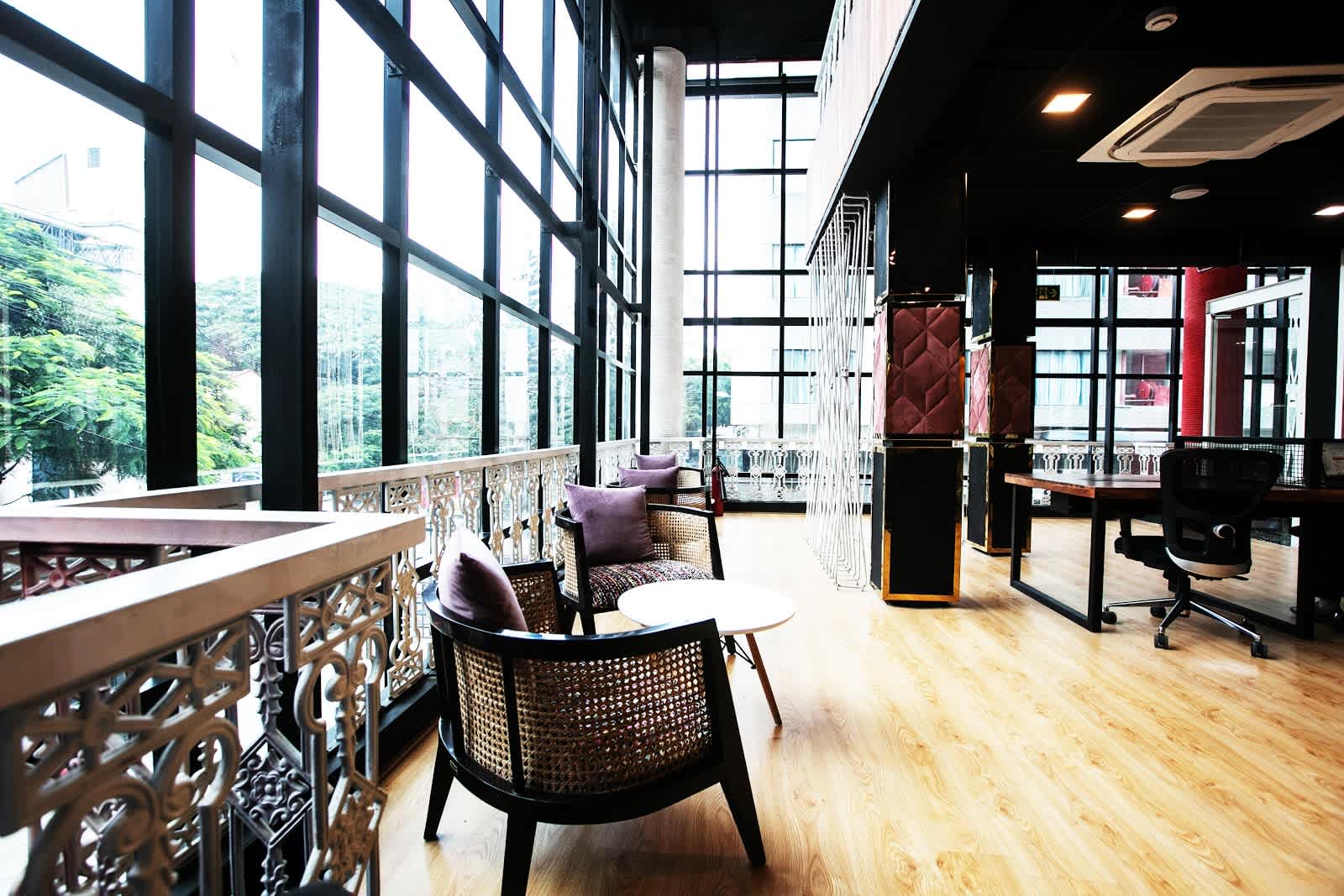
Largest Coworking Companies


India, being one of the most populous countries in the world, naturally has a lot of coworking spaces. In fact, India is one of the fastest-growing markets in the industry. While there are plenty of studies and statistics we could analyze, there's really nothing more eye-opening than a straightforward talk with a founder who's been on the front lines. We sat down with Mr. Gurbinder Rattha, founder and Managing Director of Workafella, a luxurious coworking chain based in Chennai that emphasizes wellness and customized service. We asked him few questions about Workafella's journey to the top in such a competitive market:
What inspires the mission of Workafella?
Imagine walking into an office space where the energizing aroma of coffee stimulates your senses gearing you up for the beginning of a fresh workday; a space with an electric work atmosphere that allows you to feed off its energy and shed the ‘Monday Morning Blues right at the elevator. We at Workafella seek to give a completely new twist to work culture in India. Keeping in mind the young India’s ‘anything is achievable’ attitude, Workafella offers energetic and vibrant work environments for young minds, daring thinkers and unstoppable doers who give shape to their wildest dreams.
At Workafella our mission is to create a complete business ecosystem, ensuring that once a customer walks in, they never have to worry about anything other than the task at hand. Workafella was the first in India to offer a 24/7 office space with an all-inclusive price and no hidden costs. Workafella also pioneered providing ancillary support such as in-house HR to support its member firms and their employees as well a Finance team (Virtual CFO) to assist with compliance and tax-related queries. Workafella also has multiple tie-ups that benefit its clients, such as pharmacies, crèche, gym, cabs, hotels etc, all of which enable members to truly achieve ‘Work-Life Balance’.
I notice that the decorative themes in your space are filled with warm colors, natural materials, etc... What are some things that influenced the design of your locations?
Workafella, founded by the Rattha group, is the beneficiary of its parent company’s vast experience in the hospitality and real estate sectors. Employing the expertise garnered by the Rattha Group has enabled Workafella to have its finger on the pulse, with workspaces designed while keeping the young and vibrant Indian workforce in mind.
While the décor has a consistent look and feel in all the centres, a little bit of the “local work culture” has been infused into each centre, varying by location. India being a diverse country and Workafella being a home-grown coworking space provider ensures that in each city, we observe the social norms, food habits, local tastes, etc.
Our decorative themes are also inspired by a management team that loves to travel, has exposure to a variety of different cultures and aesthetics acquired along their journey. Exposed to global contemporary designs and a future-forward thought process, our designs reconcile the global and the local within the minds of Indian youths. Workafella, a home-grown brand, believes in bringing the essence of India to coworking while nonetheless drawing from international sophistication.

What coworking software or method do you use to manage customer relations and stay in touch with your clients’ needs?
Most coworking spaces will agree that one of the most important and challenging aspects of running a coworking space is member relations. With the ever-growing competition in the coworking space recently, many industry players have been investing heavily in customer relations in order to find the right mix to satisfying existing clients and preserving a space’s community dynamic while also attracting new members.
We at Workafella take CRM seriously and use the software to manage the customer journey end-to-end. We are in the process of digitizing the entire customer cycle; chief among these efforts is our soon to be launched community app for our members. The app will not only help our clients network with one another but also serve as a two-way communication platform between our customers and our team. The app will help us collect valuable data that will, in turn, enable us to address member concerns more efficiently and serve them better. Furthermore, the app will facilitate collaborative events, enable members to avail relevant offers and benefits, and stay aware of our ever-expanding list of tie-ups with other brands and companies.
We believe in digitization, but one that retains the human element, which we feel in an important factor that many players in this segment miss. Our goal is to have a social hub that emphasizes the value of community and cooperation, ultimately helping our members achieve more together. Currently, we have our reception desk and our community management team, who cater to all client’s requirements.
Coworking Space Management Guide
A comprehensive guide to help you manage your coworking space.
DownloadHow do you feel about the coworking industry in general? In your experience, do you think it is slowing down or is there still a lot of growth to come?
Coworking in India is still at a very nascent stage. Currently, there is an immense potential for structured players to expand at an even faster pace. Our research indicates that the overall stock of flexible space market in India (including all seven Indian cities) increased by about 50%, from almost 10 million sq. ft. in 2017 to about 15 million sq. ft. by Q3 2018, making it among the biggest markets in the APAC region. A recent research report I perused states that by 2020, co-working spaces in India have the potential to not only double, but possibly overtake the traditional office format.
Critically, I believe that large enterprises will drive the lion’s share of demand for shared office spaces. Again, I would refer you to the most recent research, which indicates big corporates will drive as much as 40-45% of demand for coworking in the years to come. I believe this makes sense, given that their employees and teams have much to gain from aspects of coworking such as implicit skills transfer; the impact of reduced capex on designing and inhabiting an office space or investment in employee upskilling can provide a major boost to a corporate’s bottom line.
As we grow, we see a natural improvement in our services: we strive to evolve with the changing needs of the clients and have a better understanding of what the current generation of the Indian workers expects from of their work environment. Keeping this and the growing Indian economy in mind, there is tremendous scope for growth in the co-working sector, especially for homegrown spaces, despite the arrival of international brands to our shores. The competition looks to be getting stiffer, yet we remain confident — we foresee more innovative products and services that will not only help the coworking industry in India to evolve but also compete with global standards.
Why is India such a good hub for coworking?
Commercial rent in India attracts a host of logistical nightmares such as the ever-increasing rental cost, parking heavy funds with the property owner as rental deposits, etc. Coworking spaces negate such concerns — rather; they are primarily designed to be adaptable to the needs of freelancers, small businesses, start-ups or large corporates. Co-working spaces typically work on a leasing model where workers can rent out workstations on an hourly, daily, weekly, or longer-term basis. This saves companies the cost of leasing out office space and investing in instantly depreciating infrastructure such as air conditioning, printers, coffee machines, etc. The plug and play capability of coworking spaces, along with the fact that most companies save close to 30% when opting for shared office spaces, is what is attracting companies to such spaces fuelling the growth of the industry.
India is one of the fastest growing economies in the world and over 70% of the Indian workforce comprises of millennials. Fuelled by a seemingly indefatigable start-up culture, the coworking industry has carved out a niche for itself in the marketplace. For these reasons, it is not hard to see why India is becoming a favourable investment destination for national and international co-working players.
Another dimension to the growth of the coworking industry in India is the predominance of Tier-I cities when it comes to the number of shared office spaces. That said, trends indicate rapid influx of co-working providers into Tier-II cities. We believe, with increasing disposable income, ample talent pools at lower costs and plenty of space to grow, Tier-IIs will become an increasingly favourable investment destination for corporate India. The new age economy has reduced the need for headquartering in major cities. We at Workafella ourselves plan to fuel the coworking revolution in Tier II Indian cities by expanding into places like Vishakhapatnam, Kochi, Ahmedabad, Coimbatore and Chandigarh. We understand the positive sentiment towards homegrown businesses and believe we are well positioned to herald this new movement while improving the infrastructure and economies of these regions.
Why do your clients choose Workafella over more global chains like WeWork or Knotel?
Workafella provides users with end-to-end solutions from the absolutely essential to the truly game-changing: some highlights are 24/7 access and air-conditioning, private working space with access control, Social hub, gym, crèche, complimentary meeting room, to name but a few. Workafella provides plush interiors with an impressive gamut of services, like on-call doctors, runner boys, mini fridges, shower cubicles, round-the-clock IT back up with top of the line IT services, high-speed Internet with two-three service providers, Wi-Fi, security, and even laundry on demand.
While a few global chains may offer some or most of these services, what truly sets us apart is the fact that we are a homegrown brand that has done so while retaining a connection to India and placing them in the context of the millennial worker. We feel the nuanced spaces we create retain the personality of its home city. This ability to unify the essence of India and international sophistication is the primary factor for clients to choose us over a global chain.
Do you think the company’s heavy background in real estate has given Workafella an advantage over other newer coworking brands as you’ve grown?
The Rattha Group, established in the Indian city of Chennai in 1992. The company over the years have expanded their footprints in Housing Development, Residential and commercial development, and Hospitality. The established business verticals are strategically positioned and synergistically operated to each create tremendous value and produce excellent returns over the business cycle. The success of the group's global undertakings is a mirror that reflects the vigour of the company's incorporated ventures that are groomed on the basis of a strong logical investment pattern and the urge to attain excellence in all the fields. The Rattha group continues to create value for their partners and for other company stakeholders such as customers, employees and partners.
While commercial development and hospitality are certainly the most pertinent to the establishment and operation of a co-working space, the breadth of expertise that the Rattha group can bring to bear on any challenge is what enables Workafella to lead the way in so many different areas. The cumulative insights drawn from these verticals will ensure that Workafella is constantly pushing the envelope and scrutinising the co-working paradigm through many different lenses.
Save your community manager 41 hours each week—learn how The Yard did it with cloud-based access control.
Read the Case StudyFree access to our best guides, industry insights and more.
